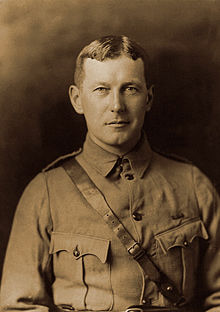
Son of Lieutenant-Colonel David McCrae and Janet Simpson Eckford McCrae of Guelph, ON. Survived by his sister, Geills, and his brother, Tom. Joined the Highfield Cadet Corps at 14 and at 17 enlisted in the Militia field battery commanded by his father. When the war broke out, McCrae was one of the earliest to enlist. He was 42 years old at the time.
He was appointed as Medical Officer and Major of the 1st Brigade CFA (Canadian Field Artillery). He treated the wounded during the Second Battle of Ypres in 1915, from a hastily dug, 8 foot by 8 foot bunker dug in the back of the dyke along the Yser Canal about 2 miles north of Ypres. During his service, Lt. Col. McCrae was awarded the Queen's South Africa Medal with Clasps, the 1914-15 Star, the Victory Medal and the British War Medal.
McCrae is widely known as the author of the famous poem "In Flanders Fields." He began writing poetry while a student at the Guelph Collegiate Institute. "In Flanders Fields" was written on May 3, 1915, the day after his close friend and former militia pal Alexis Helmer was killed in battle and buried in a makeshift grave with a simple wooden cross. McCrae presided over his funeral. "In Flanders Fields" was the second last poem he would ever write.
On January 28, 1918, he died of pneumonia and meningitis proceeding a five-day illness. The day he fell ill, he learned he would be the first Canadian to be appointed consulting physician to the First British Army. In 1946, he was officially designated a Person of National Historic Significance.
***
"In Flanders Fields"
In Flanders fields the poppies blow
Between the crosses, row on row,
That mark our place; and in the sky
The larks, still bravely singing, fly
Scarce heard amid the guns below.
We are the dead, short days ago
We lived, felt dawn, saw sunset glow,
Loved and were loved, and now we lie
In Flanders fields.
Take up our quarrel with the foe:
To you from failing hands we throw
The torch; be yours to hold it high.
If ye break faith with us who die
We shall not sleep, though poppies grow
In Flanders fields.
–John McCrae